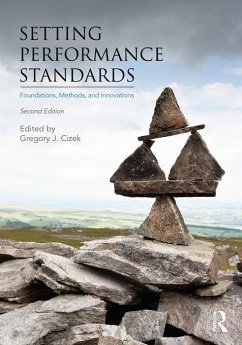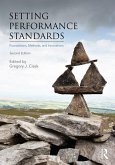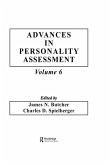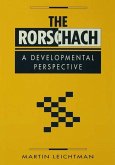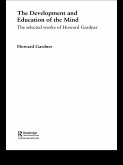Setting Performance Standards (eBook, ePUB)
Foundations, Methods, and Innovations
Redaktion: Cizek, Gregory J.
62,95 €
62,95 €
inkl. MwSt.
Sofort per Download lieferbar

31 °P sammeln
62,95 €
Als Download kaufen

62,95 €
inkl. MwSt.
Sofort per Download lieferbar

31 °P sammeln
Jetzt verschenken
Alle Infos zum eBook verschenken
62,95 €
inkl. MwSt.
Sofort per Download lieferbar
Alle Infos zum eBook verschenken

31 °P sammeln
Setting Performance Standards (eBook, ePUB)
Foundations, Methods, and Innovations
Redaktion: Cizek, Gregory J.
- Format: ePub
- Merkliste
- Auf die Merkliste
- Bewerten Bewerten
- Teilen
- Produkt teilen
- Produkterinnerung
- Produkterinnerung

Bitte loggen Sie sich zunächst in Ihr Kundenkonto ein oder registrieren Sie sich bei
bücher.de, um das eBook-Abo tolino select nutzen zu können.
Hier können Sie sich einloggen
Hier können Sie sich einloggen
Sie sind bereits eingeloggt. Klicken Sie auf 2. tolino select Abo, um fortzufahren.

Bitte loggen Sie sich zunächst in Ihr Kundenkonto ein oder registrieren Sie sich bei bücher.de, um das eBook-Abo tolino select nutzen zu können.
This second edition solidifies Setting Performance Standards as the only book providing a comprehensive profile of both the issues and the "how-to" methods that define this thorny field.
- Geräte: eReader
- mit Kopierschutz
- eBook Hilfe
- Größe: 10.29MB
Andere Kunden interessierten sich auch für
![Setting Performance Standards (eBook, PDF) Setting Performance Standards (eBook, PDF)]() Setting Performance Standards (eBook, PDF)62,95 €
Setting Performance Standards (eBook, PDF)62,95 €![Delivering Psycho-educational Evaluation Results to Parents (eBook, ePUB) Delivering Psycho-educational Evaluation Results to Parents (eBook, ePUB)]() Francis J. DematteoDelivering Psycho-educational Evaluation Results to Parents (eBook, ePUB)33,95 €
Francis J. DematteoDelivering Psycho-educational Evaluation Results to Parents (eBook, ePUB)33,95 €![Reading Empirical Research Studies (eBook, ePUB) Reading Empirical Research Studies (eBook, ePUB)]() Reading Empirical Research Studies (eBook, ePUB)46,95 €
Reading Empirical Research Studies (eBook, ePUB)46,95 €![Advances in Personality Assessment (eBook, ePUB) Advances in Personality Assessment (eBook, ePUB)]() Advances in Personality Assessment (eBook, ePUB)36,95 €
Advances in Personality Assessment (eBook, ePUB)36,95 €![The Rorschach (eBook, ePUB) The Rorschach (eBook, ePUB)]() Martin LeichtmanThe Rorschach (eBook, ePUB)26,95 €
Martin LeichtmanThe Rorschach (eBook, ePUB)26,95 €![Abuse Between Young People (eBook, ePUB) Abuse Between Young People (eBook, ePUB)]() Carlene FirminAbuse Between Young People (eBook, ePUB)38,95 €
Carlene FirminAbuse Between Young People (eBook, ePUB)38,95 €![The Development and Education of the Mind (eBook, ePUB) The Development and Education of the Mind (eBook, ePUB)]() Howard GardnerThe Development and Education of the Mind (eBook, ePUB)38,95 €
Howard GardnerThe Development and Education of the Mind (eBook, ePUB)38,95 €-
-
-
This second edition solidifies Setting Performance Standards as the only book providing a comprehensive profile of both the issues and the "how-to" methods that define this thorny field.
Dieser Download kann aus rechtlichen Gründen nur mit Rechnungsadresse in A, B, BG, CY, CZ, D, DK, EW, E, FIN, F, GR, HR, H, IRL, I, LT, L, LR, M, NL, PL, P, R, S, SLO, SK ausgeliefert werden.
Produktdetails
- Produktdetails
- Verlag: Taylor & Francis eBooks
- Seitenzahl: 616
- Erscheinungstermin: 22. März 2012
- Englisch
- ISBN-13: 9781136946714
- Artikelnr.: 38277546
- Verlag: Taylor & Francis eBooks
- Seitenzahl: 616
- Erscheinungstermin: 22. März 2012
- Englisch
- ISBN-13: 9781136946714
- Artikelnr.: 38277546
- Herstellerkennzeichnung Die Herstellerinformationen sind derzeit nicht verfügbar.
Gregory J. Cizek (PhD Michigan State University) is Professor of Educational Measurement and Evaluation at the University of North Carolina at Chapel Hill, where he teaches courses in applied testing, statistics, and research methods. The author or editor of numerous books, he is the President-Elect of the National Council on Measurement in Education (NCME).
I. Conceptual and Practical Foundations of Standard Setting 1. An
Introduction To Contemporary Standard Setting: Concepts, Characteristics,
and Contexts Gregory J. Cizek 2. So Much Has Changed: An Historical
Overview of Setting Cutscores Michael J. Zieky 3. Standard Setting for
Decision Making: Classifications, Consequences, and the Common Good
William A. Mehrens and Gregory J. Cizek 4. Essential Steps in Setting
Performance Standards on Educational Tests and Strategies for Assessing the
Reliability and Validity of Results Ronald K. Hambleton, Mary J. Pitoniak,
and Jenna Coppella II. Common Elements in Standard Setting Practice 5.
Performance Level Descriptors: History, Practice, and a Proposed Framework
Karla L. Egan, M. Christina Schneider, and Steve Ferrara 6. Selecting and
Training Standard Setting Participants: State of the Art Policies and
Procedures Susan Cooper Loomis 7. Understanding the Cognitive Processes of
Standard Setting Panelists William P. Skorupski 8. The Role, Format, and
Impact of Feedback to Standard Setting Panelists Mark D. Reckase and Jing
Chen 9. The Forms and Functions of Evaluations of the Standard-Setting
Process Gregory J. Cizek III. Standard Setting Methods 10. Variations on a
Theme: The Modified Angoff, Extended Angoff, and Yes/No Standard Setting
Methods Barbara Plake and Gregory J. Cizek 11. Setting Performance
Standards on Complex Assessments: The Body of Work Method Neal M. Kingston
and Gail C. Tiemann 12. The Bookmark Standard-Setting Procedure Daniel M.
Lewis, Howard Mitzel, Ricardo L. Mercado, and E. Matthew Schulz 13. The
Item-Descriptor (ID) Matching Method Steve Ferrara and Daniel M. Lewis 14.
The Briefing Book Method Edward H. Haertel, Jennifer Biemers, and Julie
Miles 15. From Z to A: Using Validity Evidence to Set Performance Standards
Kimberly O'Malley, Leslie Keng, and Julie Miles 16. The Benchmark Method of
Standard Setting Gary W. Phillips 17. Setting Achievement Standards on
Assessments for Students with Disabilities Marianne Perie and Martha
Thurlow 18. Applying Model-Based Approaches to Performance Category
Classifications Jonathan Templin and Hong Jiao 19. Reviewing or
Revalidating Performance Standards on Credentialing Examinations John
Mattar, Ronald Hambleton, Jenna Coppella, and Michael Finger IV.
Contemporary Issues in Standard Setting 20. Practical Issues in Standard
Setting Michael B. Bunch 21. Growth, Standards, and Accountability Damian
Betebenner 22. Standard Setting for Computer-Based Assessments: A Summary
of Mode Comparability Research and Considerations Denny Way and Katie
Larsen McClarty 23. Vertically-Moderated Standard Setting Gregory J. Cizek
and Charlotte A. Agger 24. Setting Passing Standards for Credentialing
Programs Chad W. Buckendahl and Susan L. Davis-Becker 25. Legal Issues and
Considerations for Standard Setting in Professional Licensure and
Certification Examinations Dale Atkinson 26. Legal Issues for Standard
Setting in K-12 Educational Contexts S. E. Phillips 27. Moving Forward:
Educational, Social, and Population Considerations in Setting Standards
William J. Brown
Introduction To Contemporary Standard Setting: Concepts, Characteristics,
and Contexts Gregory J. Cizek 2. So Much Has Changed: An Historical
Overview of Setting Cutscores Michael J. Zieky 3. Standard Setting for
Decision Making: Classifications, Consequences, and the Common Good
William A. Mehrens and Gregory J. Cizek 4. Essential Steps in Setting
Performance Standards on Educational Tests and Strategies for Assessing the
Reliability and Validity of Results Ronald K. Hambleton, Mary J. Pitoniak,
and Jenna Coppella II. Common Elements in Standard Setting Practice 5.
Performance Level Descriptors: History, Practice, and a Proposed Framework
Karla L. Egan, M. Christina Schneider, and Steve Ferrara 6. Selecting and
Training Standard Setting Participants: State of the Art Policies and
Procedures Susan Cooper Loomis 7. Understanding the Cognitive Processes of
Standard Setting Panelists William P. Skorupski 8. The Role, Format, and
Impact of Feedback to Standard Setting Panelists Mark D. Reckase and Jing
Chen 9. The Forms and Functions of Evaluations of the Standard-Setting
Process Gregory J. Cizek III. Standard Setting Methods 10. Variations on a
Theme: The Modified Angoff, Extended Angoff, and Yes/No Standard Setting
Methods Barbara Plake and Gregory J. Cizek 11. Setting Performance
Standards on Complex Assessments: The Body of Work Method Neal M. Kingston
and Gail C. Tiemann 12. The Bookmark Standard-Setting Procedure Daniel M.
Lewis, Howard Mitzel, Ricardo L. Mercado, and E. Matthew Schulz 13. The
Item-Descriptor (ID) Matching Method Steve Ferrara and Daniel M. Lewis 14.
The Briefing Book Method Edward H. Haertel, Jennifer Biemers, and Julie
Miles 15. From Z to A: Using Validity Evidence to Set Performance Standards
Kimberly O'Malley, Leslie Keng, and Julie Miles 16. The Benchmark Method of
Standard Setting Gary W. Phillips 17. Setting Achievement Standards on
Assessments for Students with Disabilities Marianne Perie and Martha
Thurlow 18. Applying Model-Based Approaches to Performance Category
Classifications Jonathan Templin and Hong Jiao 19. Reviewing or
Revalidating Performance Standards on Credentialing Examinations John
Mattar, Ronald Hambleton, Jenna Coppella, and Michael Finger IV.
Contemporary Issues in Standard Setting 20. Practical Issues in Standard
Setting Michael B. Bunch 21. Growth, Standards, and Accountability Damian
Betebenner 22. Standard Setting for Computer-Based Assessments: A Summary
of Mode Comparability Research and Considerations Denny Way and Katie
Larsen McClarty 23. Vertically-Moderated Standard Setting Gregory J. Cizek
and Charlotte A. Agger 24. Setting Passing Standards for Credentialing
Programs Chad W. Buckendahl and Susan L. Davis-Becker 25. Legal Issues and
Considerations for Standard Setting in Professional Licensure and
Certification Examinations Dale Atkinson 26. Legal Issues for Standard
Setting in K-12 Educational Contexts S. E. Phillips 27. Moving Forward:
Educational, Social, and Population Considerations in Setting Standards
William J. Brown
I. Conceptual and Practical Foundations of Standard Setting 1. An
Introduction To Contemporary Standard Setting: Concepts, Characteristics,
and Contexts Gregory J. Cizek 2. So Much Has Changed: An Historical
Overview of Setting Cutscores Michael J. Zieky 3. Standard Setting for
Decision Making: Classifications, Consequences, and the Common Good
William A. Mehrens and Gregory J. Cizek 4. Essential Steps in Setting
Performance Standards on Educational Tests and Strategies for Assessing the
Reliability and Validity of Results Ronald K. Hambleton, Mary J. Pitoniak,
and Jenna Coppella II. Common Elements in Standard Setting Practice 5.
Performance Level Descriptors: History, Practice, and a Proposed Framework
Karla L. Egan, M. Christina Schneider, and Steve Ferrara 6. Selecting and
Training Standard Setting Participants: State of the Art Policies and
Procedures Susan Cooper Loomis 7. Understanding the Cognitive Processes of
Standard Setting Panelists William P. Skorupski 8. The Role, Format, and
Impact of Feedback to Standard Setting Panelists Mark D. Reckase and Jing
Chen 9. The Forms and Functions of Evaluations of the Standard-Setting
Process Gregory J. Cizek III. Standard Setting Methods 10. Variations on a
Theme: The Modified Angoff, Extended Angoff, and Yes/No Standard Setting
Methods Barbara Plake and Gregory J. Cizek 11. Setting Performance
Standards on Complex Assessments: The Body of Work Method Neal M. Kingston
and Gail C. Tiemann 12. The Bookmark Standard-Setting Procedure Daniel M.
Lewis, Howard Mitzel, Ricardo L. Mercado, and E. Matthew Schulz 13. The
Item-Descriptor (ID) Matching Method Steve Ferrara and Daniel M. Lewis 14.
The Briefing Book Method Edward H. Haertel, Jennifer Biemers, and Julie
Miles 15. From Z to A: Using Validity Evidence to Set Performance Standards
Kimberly O'Malley, Leslie Keng, and Julie Miles 16. The Benchmark Method of
Standard Setting Gary W. Phillips 17. Setting Achievement Standards on
Assessments for Students with Disabilities Marianne Perie and Martha
Thurlow 18. Applying Model-Based Approaches to Performance Category
Classifications Jonathan Templin and Hong Jiao 19. Reviewing or
Revalidating Performance Standards on Credentialing Examinations John
Mattar, Ronald Hambleton, Jenna Coppella, and Michael Finger IV.
Contemporary Issues in Standard Setting 20. Practical Issues in Standard
Setting Michael B. Bunch 21. Growth, Standards, and Accountability Damian
Betebenner 22. Standard Setting for Computer-Based Assessments: A Summary
of Mode Comparability Research and Considerations Denny Way and Katie
Larsen McClarty 23. Vertically-Moderated Standard Setting Gregory J. Cizek
and Charlotte A. Agger 24. Setting Passing Standards for Credentialing
Programs Chad W. Buckendahl and Susan L. Davis-Becker 25. Legal Issues and
Considerations for Standard Setting in Professional Licensure and
Certification Examinations Dale Atkinson 26. Legal Issues for Standard
Setting in K-12 Educational Contexts S. E. Phillips 27. Moving Forward:
Educational, Social, and Population Considerations in Setting Standards
William J. Brown
Introduction To Contemporary Standard Setting: Concepts, Characteristics,
and Contexts Gregory J. Cizek 2. So Much Has Changed: An Historical
Overview of Setting Cutscores Michael J. Zieky 3. Standard Setting for
Decision Making: Classifications, Consequences, and the Common Good
William A. Mehrens and Gregory J. Cizek 4. Essential Steps in Setting
Performance Standards on Educational Tests and Strategies for Assessing the
Reliability and Validity of Results Ronald K. Hambleton, Mary J. Pitoniak,
and Jenna Coppella II. Common Elements in Standard Setting Practice 5.
Performance Level Descriptors: History, Practice, and a Proposed Framework
Karla L. Egan, M. Christina Schneider, and Steve Ferrara 6. Selecting and
Training Standard Setting Participants: State of the Art Policies and
Procedures Susan Cooper Loomis 7. Understanding the Cognitive Processes of
Standard Setting Panelists William P. Skorupski 8. The Role, Format, and
Impact of Feedback to Standard Setting Panelists Mark D. Reckase and Jing
Chen 9. The Forms and Functions of Evaluations of the Standard-Setting
Process Gregory J. Cizek III. Standard Setting Methods 10. Variations on a
Theme: The Modified Angoff, Extended Angoff, and Yes/No Standard Setting
Methods Barbara Plake and Gregory J. Cizek 11. Setting Performance
Standards on Complex Assessments: The Body of Work Method Neal M. Kingston
and Gail C. Tiemann 12. The Bookmark Standard-Setting Procedure Daniel M.
Lewis, Howard Mitzel, Ricardo L. Mercado, and E. Matthew Schulz 13. The
Item-Descriptor (ID) Matching Method Steve Ferrara and Daniel M. Lewis 14.
The Briefing Book Method Edward H. Haertel, Jennifer Biemers, and Julie
Miles 15. From Z to A: Using Validity Evidence to Set Performance Standards
Kimberly O'Malley, Leslie Keng, and Julie Miles 16. The Benchmark Method of
Standard Setting Gary W. Phillips 17. Setting Achievement Standards on
Assessments for Students with Disabilities Marianne Perie and Martha
Thurlow 18. Applying Model-Based Approaches to Performance Category
Classifications Jonathan Templin and Hong Jiao 19. Reviewing or
Revalidating Performance Standards on Credentialing Examinations John
Mattar, Ronald Hambleton, Jenna Coppella, and Michael Finger IV.
Contemporary Issues in Standard Setting 20. Practical Issues in Standard
Setting Michael B. Bunch 21. Growth, Standards, and Accountability Damian
Betebenner 22. Standard Setting for Computer-Based Assessments: A Summary
of Mode Comparability Research and Considerations Denny Way and Katie
Larsen McClarty 23. Vertically-Moderated Standard Setting Gregory J. Cizek
and Charlotte A. Agger 24. Setting Passing Standards for Credentialing
Programs Chad W. Buckendahl and Susan L. Davis-Becker 25. Legal Issues and
Considerations for Standard Setting in Professional Licensure and
Certification Examinations Dale Atkinson 26. Legal Issues for Standard
Setting in K-12 Educational Contexts S. E. Phillips 27. Moving Forward:
Educational, Social, and Population Considerations in Setting Standards
William J. Brown
